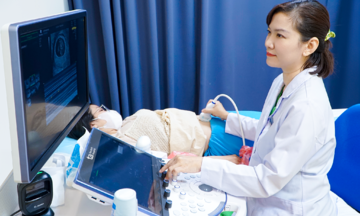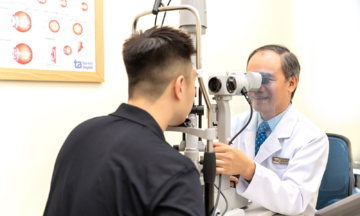For the past few months, Thong experienced fatigue, palpitations, and a rapid heartbeat, leading him to seek treatment at Tam Anh General Hospital in Ho Chi Minh City. Dr. Le Thi Ngoc Hang, from the Thoracic - Vascular Surgery Department, diagnosed him with recurrent hyperthyroidism. His thyroid nodule had rapidly grown to 55x46x31 mm, forming a large goiter. The goiter no longer responded to medical treatment, requiring surgical removal to prevent compression of surrounding organs and reduce the risk of hyperthyroidism recurrence.
A hyperthyroid goiter is a condition where the thyroid gland grows abnormally large and produces excessive thyroid hormones, disrupting many bodily functions. This is also known as a toxic goiter. If left uncontrolled, it can lead to heart complications such as atrial fibrillation, heart failure, and high blood pressure. It can also affect the nervous system, causing agitation, loss of emotional control, tremors, and muscle weakness.
Dr. Tran Cong Quyen, Deputy Head of the Thoracic - Vascular Surgery Department, explained that hyperthyroid goiters are more challenging to operate on than non-toxic goiters (benign or malignant). These goiters have increased blood vessel proliferation, and improper dissection can cause difficult-to-control bleeding. There's also a risk of damaging the recurrent laryngeal nerve, leading to hoarseness, or causing numbness in the extremities (hypocalcemia) due to parathyroid gland damage.
Before surgery, Thong received treatment to control his hyperthyroidism with antithyroid drugs and beta-blockers. The surgical team used a scalpel to dissect the goiter while carefully avoiding damage to blood vessels. After two hours, the entire thyroid gland was removed without affecting surrounding organs such as the recurrent laryngeal nerve, trachea, or parathyroid glands. Blood loss was minimal, and Thong didn't require a transfusion.
 |
Doctors operate to remove the patient's hyperthyroid goiter. Photo: Ha Vu |
Doctors operate to remove the patient's hyperthyroid goiter. Photo: Ha Vu
Thong recovered well after surgery, able to eat and speak normally. He was discharged three days later. The biopsy results confirmed the goiter was benign.
According to Dr. Hang, approximately 80% of hyperthyroidism cases are caused by the autoimmune disorder Graves' disease. Other causes include excess iodine, pituitary gland disorders, and thyroiditis. Women are at higher risk than men.
Early-stage hyperthyroidism often presents with no noticeable symptoms or symptoms easily mistaken for other conditions. Regular check-ups are crucial for prevention, especially for high-risk groups. Maintaining a healthy lifestyle and diet, including sufficient iodine intake, regular exercise, and a balanced diet with all essential nutrients are important. Getting enough sleep, limiting stress, avoiding processed foods, fried foods, alcoholic beverages, stimulants, and refraining from smoking can also help prevent the disease.
Thu Ha
*The patient's name has been changed.
| Readers can submit questions about cancer here for doctors to answer. |












